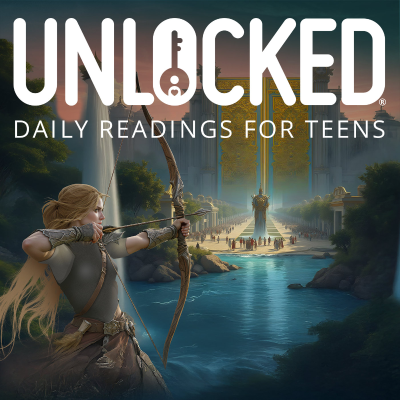
Unlocked: Daily Devotions for Teens
Englisch
Kostenlos bei Podimo
Kostenlos hören bei Podimo
Starte jetzt und verbinde dich mit deinen Lieblingspodcaster*innen
- Vertraut von über 1 Mio. deutschen Hörer*innen
- Über 1.000 lokale Podcasts und Shows – nur bei Podimo
- Keine Zahlung nötig
Mehr Unlocked: Daily Devotions for Teens
Unlocked is a daily teen devotional, centered on God’s Word. Each day’s devotion—whether fiction, poetry, or essay—asks the question: How does Jesus and what He did affect today’s topic? With daily devotions read by our hosts, Natalie and Dylan, and questions designed to encourage discussion and a deeper walk with Christ, Unlocked invites teens to both engage with the Bible and to write and submit their own devotional pieces.
Alle Folgen
5450 FolgenJourney of Anxiety
READ: JOSHUA 1:9; PHILIPPIANS 4:6-8; HEBREWS 4:14-16 [https://www.biblegateway.com/passage/?search=JOSHUA%201%3A9%3B%20PHILIPPIANS%204%3A6-8%3B%20HEBREWS%204%3A14-16&version=NIV] Anxiety can haunt you in many forms. When I was 10, I was officially diagnosed with anxiety. It was minor compared to other cases. I sometimes got stressed over social interactions, feeling like I might’ve said something mean, and stressing that everyone hated me for something that wasn’t even that bad in the eyes of someone else. It made me feel like God couldn’t love me because I only made a negative impact. I’d also get really stressed over little tasks like my homework. Currently, I’m still battling anxiety, but it’s nowhere near as bad. There are many strategies that help me get through it, and I’d love to share some of them. My prayer is that it will help you, whether or not anxiety is something you struggle with long-term. My first strategy is to memorize. Memorize Scripture. Hold it in your heart so when times of trouble come, you can use Scripture to help you rest in Jesus and stand firm against the devil’s schemes (Psalm 9:9; Matthew 4:1-11; Ephesians 6:11). For example, Joshua 1:9 and 1 Peter 5:7 encourage us that God is with us and He wants to help us with all our struggles. Additionally, Philippians 4:6-8 is a great reminder that when we are struggling with anxiety, we should pray, which brings me to my second point. Pray. God already knows what is on your heart, but He wants you to cry out to Him and honestly tell Him what you’re thinking and feeling (Psalms 62:8; 139:1-4). He loves and cares for you. He died and rose again just for you. He always wants you to come to Him for peace. My final tip is to share. You’re not in this alone. It’s so helpful to have someone who can listen to you with compassion and tell you which thoughts are simply not true. The enemy wants you to feel isolated and like you’re in this alone, but you’re not. You’re loved and valued, and people want to share your burdens with you (Galatians 6:2). Remember, anxiety is nothing to be ashamed of. Anxiety can be a major struggle, but if you draw near to Jesus, you’ll see Him work in you and through you to do things more amazing than you can even imagine (John 15:5; Ephesians 3:20). • Riley Ament • What kinds of things make you anxious? Are there any strategies that have helped you in times of anxiety? • We all feel anxious from time to time. Thankfully, Jesus knows how we feel because He experienced anxiety too, and He wants to help us (Mark 14:33-34; Hebrews 4:14-16). In fact, He loves us so much that He died and rose again to save us, and He promises that one day anxiety will be gone for good (Revelation 21:1-5). How might knowing that Jesus can truly empathize with our struggles make it easier for us to be honest with Him? Consider taking a moment to talk to Him about anything you’ve been struggling with lately. • Do you know anyone battling with anxiety long-term? What are some ways you could extend love and compassion to them? Consider taking a moment to pray for them now. • God wants to help us in lots of ways, not only through prayer and Scripture, but also through community with other people, such as friends, parents, pastors, and sometimes medical and mental health professionals. When you find yourself feeling anxious, who is a trusted person you could talk to about what you’re experiencing? • If you need someone to talk to, you can request a free conversation with Focus on the Family’s Counseling Department by calling 1-855-771-HELP (4357) weekdays from 6:00 a.m. to 8:00 p.m. (Mountain Time). Please be prepared to leave your contact information for a counselor to return a call to you as soon as possible. In Canada, book your appointment by calling 1-800-661-9800 between 8:00 a.m. and 4:00 p.m. (Pacific Time). Cast all your anxiety on him because he cares for you. 1 Peter 5:7 (NIV)
Fasting, Hunger, Temptation—Oh My!
READ: MATTHEW 4:1-11; 26:36-56; 27:27-46; HEBREWS 4:14-16 [https://www.biblegateway.com/passage/?search=MATTHEW%204%3A1-11%3B%2026%3A36-56%3B%2027%3A27-46%3B%20HEBREWS%204%3A14-16&version=NIV] When was the last time you were hungry? I’m not talking about your typical hunger; I’m talking about the “I haven’t eaten a single thing in over a week” kind of hunger. Most of us have not had to experience this level of hunger, and it’s mind-boggling to consider how Jesus did this willingly—not just for a week, but for forty days! Matthew wrote that Jesus was led by the Spirit into the wilderness to be tempted, or tested, by the devil (4:1). It wasn’t until after Jesus had fasted for forty days and nights that Satan came to tempt him. Why would the Holy Spirit lead Jesus into this wilderness? Why would Jesus fast? Jesus was being prepared for the journey before Him—specifically to the cross. Laying down His life as His Father asked was no simple task. It was bloody and brutal, painful till the end. He took on the punishment for all of our sins on the cross. The whole experience was so excruciating that He cried out to His Father, “My God, my God, why have you forsaken me?” (27:46). All of this, including Jesus’s temptation in the wilderness, was for our benefit. Jesus loves us. He is fully God, yet He is also fully human, and He was tempted in every way when He was on this earth. So we can take comfort in times of testing, because Jesus is with us, and He knows how we feel. And Hebrews 4:14-16 calls Jesus our Great High Priest. Because of His sacrifice on the cross for us and His victorious resurrection, we no longer have to go to a priest to make atonement for our sins as they did in the Old Testament. Instead, we can trust in the blood of Jesus alone to save us. God the Father no longer sees our sins, but the righteousness of His Son covering us. Once we’ve put our trust in Jesus, we can approach God’s throne with freedom and confidence, certain that we will receive God’s mercy and grace to help us in our times of need and temptation. • Savannah Coleman • Resisting temptation is hard—Jesus is the only one who did it perfectly! When we’re struggling with temptation of any kind, Jesus empathizes with us. He has so much compassion for us, and He wants to help us. Once we’ve put our trust in Jesus, we can know that He has given us His Holy Spirit, along with His Word (the Bible) and His people (the church), to help us resist temptation and follow God by living in His good ways. Can you think of a time Jesus helped you resist temptation? Consider taking some time to thank Him for that today! Submit yourselves, then, to God. Resist the devil, and he will flee from you. James 4:7 (NIV)
My Unquenchable Thirst
READ: JOHN 4:7-42; 7:37-39; 10:10-11 [https://www.biblegateway.com/passage/?search=JOHN%204%3A7-42%3B%207%3A37-39%3B%2010%3A10-11&version=NIV] I stand in a large room, staring at a table. About twenty cups, ranging from jeweled goblets to simple glasses, are arranged before me. I walk to the table and pick up the biggest, fanciest goblet. The word “Money” is laid out in beautiful jewels. The drink inside tastes like soda. It satisfies my thirst for a moment, but soon my mouth is dry once again. I take another cup, this one engraved with the word “Popularity.” It’s full of what looks like pink lemonade. It tastes wonderful for a second, but then, once again, I am thirsty. I drink from several more glasses, tasting “Power,” “Lust,” and “Control.” Another, which reads, “Good Works,” is filled to the brim with water mixed with a drink powder. None of the cups satisfy me. I am always left dry. But what is this? Hidden behind an ornate goblet is a humble mug with the words “Salvation in Jesus” painted on it. It’s filled with…water? That doesn’t seem as good as the other drinks. But nothing else has worked. I taste the water in the mug. It is good! I take another sip, and another. I drink the whole mug. At last, I am no longer thirsty. The water has quenched my unquenchable thirst. • Natalie Crowe • Today’s allegorical story is inspired by John 4:7-15 and John 7:37-39. Which cup has been most enticing to you lately—money, popularity, power, lust, control, good works, or something else? How has this cup disappointed you in the past? • Jesus offers us “living water” (John 7:38). If we put our trust in Him, we receive eternal life and the Holy Spirit—who is God living in us—and the love of God fills us! Why is God’s love the only thing that will never leave us empty? (Hint: read Romans 5:5-8; 8:28-39). • If you want to know more about what it means to put your trust in Jesus, see our "Know Jesus [https://unlocked.org/knowjesus/]" page. Jesus answered, “Everyone who drinks this water will be thirsty again, but whoever drinks the water I give them will never thirst. Indeed, the water I give them will become in them a spring of water welling up to eternal life.” John 4:13-14 (NIV)
Before It All, There Was God
READ: GENESIS 1:1-3; PSALM 102:25-27; JOHN 1:1-3; EPHESIANS 1:4-6 [https://www.biblegateway.com/passage/?search=GENESIS%201%3A1-3%3B%20PSALM%20102%3A25-27%3B%20JOHN%201%3A1-3%3B%20EPHESIANS%201%3A4-6&version=NIV] Before the stars in radiance shone, Before anyone had ever seen or known The beauty of a sky at night, Before there was even dark or light, You were there. Before the earth had shape or form, Or the sea was told its bounds, Before the hills were adorned with trees And never had a plant been found, You were there. Before the waters teemed with life Or any creature had its name, Before man breathed Or life became, You were there. Forever You have been. You made it all with “Let there be.” You brought it forth with just a word. You are the holy Lord of lords. God has always been and always will be. He doesn’t have a beginning or an end. Just imagine, long before the world was made, long before God brought it into being, He already had a plan for saving us from sin. Sin didn’t come as a surprise to Him. He knew all along that we would turn away from Him, and He still created us. He had the plan in place from the beginning—to rescue us from sin and death through Jesus’s death and resurrection, and to restore all that has been broken by sin at Jesus’s glorious return. And God has had a plan for you—ever since He first made the world—and even before. He knew exactly when and where you would be born, and who would come into your life to lead you to Him. Praise be to God, the Eternal One and the Creator of the world! • Haley Walts • Have you ever thought about how God has always existed and always will? We can never fully wrap our brains around God’s eternality, and that’s okay. Consider taking some time to praise God in prayer or song, expressing any awe and wonder you feel about His eternal nature. • How does it make you feel to know that God always had a plan to save you? (If you want to know more about this good news, see our "Know Jesus [https://unlocked.org/knowjesus/]" page.) Before the mountains were born or You brought forth the whole world, from everlasting to everlasting you are God. Psalm 90:2 (NIV)
You Are Light
READ: MATTHEW 5:14-16, 1 CORINTHIANS 3:6-9 [https://www.biblegateway.com/passage/?search=MATTHEW%205%3A14-16%2C%201%20CORINTHIANS%203%3A6-9&version=NIV] Do you know that painful feeling when you turn on a light first thing in the morning or in the middle of the night? When you’ve been in a dark room for a while, light stings your eyes and makes you want to keep them closed. In Matthew 5:14-16, Jesus says, “You are the light of the world. A town built on a hill cannot be hidden. Neither do people light a lamp and put it under a bowl. Instead they put it on its stand, and it gives light to everyone in the house. In the same way, let your light shine before others, that they may see your good deeds and glorify your Father in heaven.” Light is good! If you are a Christian, you are light in a world filled with darkness. But not everyone knows this light is good. In John 8:12, Jesus says, “I am the light of the world. Whoever follows me will never walk in darkness, but will have the light of life.” This is good news! Jesus is God. He lived a perfect, sinless life on earth, sacrificed His life for our sins, rose from the grave, and ascended into heaven, where He sits enthroned over all. Because of His sacrifice and resurrection, God forgives us for our sins and promises to raise us to eternal life when Jesus returns and makes all things new. If you’ve put your trust in Jesus, you have His Holy Spirit living in you, and that means you can share the light of Jesus with everyone through what you say and what you do. But sometimes, it can be hard to share this good news with others. They might not want to hear it at first, or they might not understand it right away. It’s not easy to hear you’re a sinner who needs forgiveness! When you’ve been living in darkness for a while, light can be painful. We need patience when telling others the good news. Eventually, as they experience God’s love and kindness, they will learn the light is good—but for a while, they may choose to keep their eyes closed. But be encouraged. If you plant the seed, God can make it grow. We are called to share our faith, but ultimately, God is the one who leads people to Him. • Elizabeth Cooper • God is so very patient with us, and He keeps loving us, even when we pull away from Him. If we know Jesus, His love fills our hearts to overflowing, so we can love others and be patient with them too (1 John 4:19). Is there someone in your life God might be inviting you to share your faith with? How could you keep patiently loving them even if they seem uninterested? • If you want to dig deeper, read Matthew 4:16; John 3:19-21; Ephesians 5:1-20; Philippians 2:1-15 [Jesus said,] “You are the light of the world.” Matthew 5:14 (NIV)















































